Understanding Alzheimer's: Early Signs and How the NeuroTime Watch Can Help
If you've noticed changes in a loved one's memory or behaviour, it's natural to feel concerned. Alzheimer's disease affects millions of people worldwide, causing memory loss and cognitive decline that disrupt daily life. Early detection and supportive tools like the NeuroTime Watch can make a significant difference in managing the condition.
Memory Impairment That Interferes With Daily Activities
A prevalent initial symptom of Alzheimer's is memory impairment, particularly forgetting information that was recently acquired. This includes forgetting important dates, asking the same questions repeatedly, or increasingly relying on reminder notes and family members. The NeuroTime Watch's treatment offers support when memory begins to fade.
Challenges in Planning or Solving Problems
People with Alzheimer's may find it hard to follow a plan or work with numbers. Simple tasks like following a familiar recipe or paying monthly bills become challenging. The health monitoring features of the NeuroTime Watch can help treat the conditions caused by Alzheimer’s. It leads to better mental strength and problem-solving.
Difficulty Completing Familiar Tasks
Daily activities that were once second nature can become obstacles. Forgetting day-to-day tasks daily would be frustrating for anyone. The designers created the NeuroTime Watch's interface for Alzheimer's treatment. It helps people manage their health with more confidence.
Trouble Understanding Visual Images and Spatial Relationships
Vision problems related to Alzheimer's can lead to difficulty with balance or reading. Issues with judging distance and determining colour or contrast can affect driving and other daily tasks. While the NeuroTime Watch can't correct vision, its clear display and adjustable settings can make information easier to read.
New Problems with Words in Speaking or Writing
Joining or following a conversation can become a hurdle. People might stop in the middle of a discussion, struggle with words, or call things by the wrong name. The NeuroTime Watch offers simple communication tools that can help you express thoughts more clearly.
Misplacement of Items and Losing the Ability to Retrace Steps
Placing items in unusual places and being unable to retrace steps to find them is a common symptom. The NeuroTime Watch will over time provide better memory, leading to less frequent occurrences of misplaced items.
Decreased or Poor Judgment
Changes in decision-making or judgment, like mishandling money or neglecting personal hygiene, may occur. The NeuroTime Watch's health monitoring features can provide gentle prompts to support daily routines and self-care.
Withdrawal from Work or Social Activities
Alzheimer's can cause a person to pull back from engagements they once enjoyed. The watch encourages activity by sending reminders and tracking physical activity to promote overall well-being.
How the NeuroTime Watch Supports Alzheimer's Disease Treatment
The NeuroTime Watch is a supportive tool for Alzheimer's disease and other dementias. It offers health monitoring and organizational features to help reduce the risk of memory loss worsening.
Alzheimer’s Treatment: Treat Alzheimer’s disease 3 times a day through neuro-frequency therapy
Memory Aids: Set reminders for medications, appointments, and daily tasks.
Communication Tools: Simplified interfaces make it easier to stay connected with loved ones.
Health Monitoring: Track heart rate, sleep patterns, and activity levels to maintain overall health.
Final Thoughts
Recognizing the early signs of Alzheimer's is crucial for seeking the right support and interventions. Tools like the NeuroTime Watch can make daily life more manageable. It provides assistance that aligns with the needs of those at risk of dementia or Alzheimer's disease.
If you notice any of these symptoms in yourself or a loved one, consider buying the NeuroTime Watch. Schedule an appointment with a healthcare professional for a comprehensive evaluation. Early detection and diagnosis of dementia can make a significant difference in quality of life.

